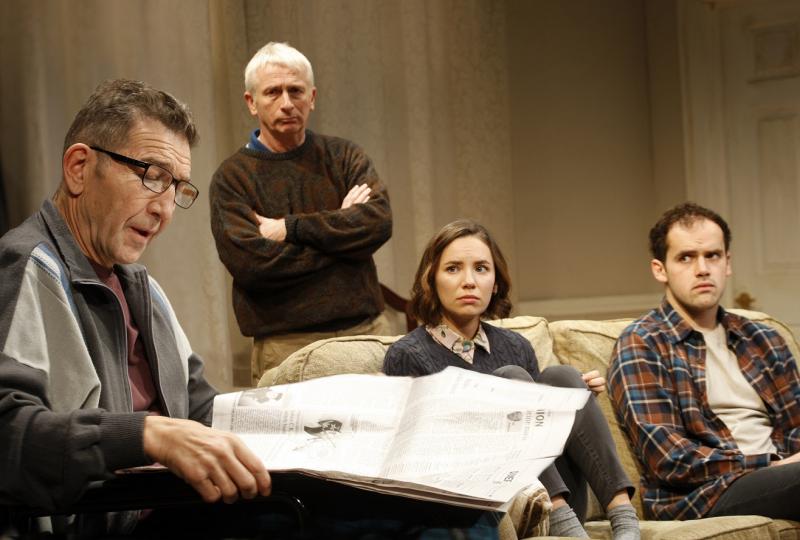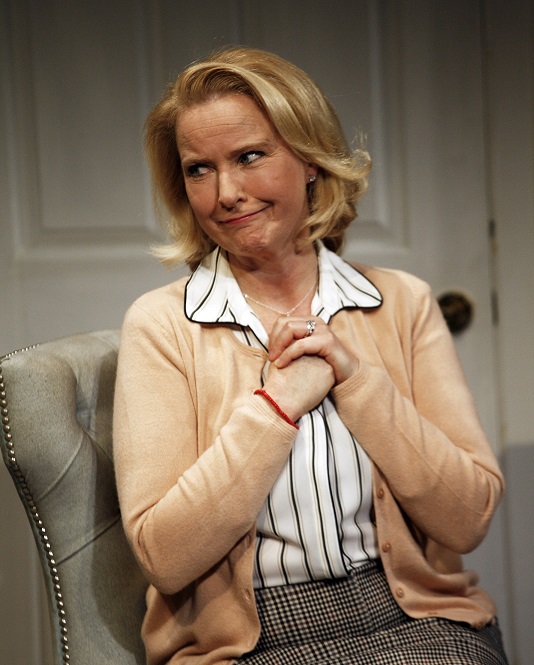The Open House, The Print Room review - razor wit, theatrical brio | reviews, news & interviews
The Open House, The Print Room review - razor wit, theatrical brio
The Open House, The Print Room review - razor wit, theatrical brio
A tyrannical family reunion and a dramatic volte-face in Will Eno's ingenious new drama

The American family has seldom looked more desperate. Will Eno’s The Open House depicts a gathering of such dismal awfulness that it surely sets precedents for this staple element of American drama.
Eno introduces his five characters, assembled for the parents’ wedding anniversary, not by name but by their role in the family, suggesting something archetypal. It’s a world, we assume, that was always dominated by Father (Greg Hicks), even before a stroke confined him to a wheelchair. Teresa Banham’s Mother (pictured below) has so long ago developed a detached resignation to her position that even the sadness has gone.
The take-over is virtually unnoticeable until its totality suddenly dawns on you
Their daughter (Lindsey Campbell) and son (Ralph Davis) have returned for this unlovely gathering, each with new developments in their own lives and to some degree still, perhaps, holding out hope that one day this family dynamic might change. A second son is referred to (even named), his absence suggesting that, for one of them at least, illusions on that front died long ago. Crispin Letts hangs in there too as the Uncle, completing the company with a benignity not deserved by his relations. The thing most urgently missing on this day, however, is the family dog (do not be alarmed, dog-lovers!).
Eno has earned a reputation as a writer you either love or loathe, and the first half of The Open House – the production runs at an uninterrupted 80 minutes – presents nay-sayers with grounds for chagrin: the unrelenting paternal barbs, the miserabilist view of life inherent in them. There’s a degree of separation from life’s reality, too: this family lives in the now, and we learn little of its connection to the world, to its past. How did it comes to this – or was it just the American way?
The dramatic absurdity is so finely tuned – no wonder Beckett is the most frequent point of comparison for Eno – the writing so razor sharp, the pauses as well as the phrases – Pinter there, too – so perfectly timed that pleasure is inevitable. There is relish both of the absurd and of absurdity as humour, and delight in language. At one point Eno throws in the word “opalescent” (new to me) and its definition, small points of shifting colour against a dark background, somehow catches the essence of his world here.
 But, although the playwright has begun to orchestrate a timeline for this meeting, with departures from and expected arrivals on its scene, at a certain point it’s hard to avoid the feeling that the potential for dramatic development is limited. At which point he engineers a coup de théâtre that is as unexpected as it is skilful (there’s an almost metaphysical quality here: we derive emotional pleasure through the engagement of intellect). Sufficient to say that the denizens of this single-room set – Tom Piper’s design has a crystalline simplicity, leaving us to concentrate on the sometimes almost still forms of the actors – change almost seamlessly. The take-over is virtually unnoticeable, until its totality suddenly dawns on you.
But, although the playwright has begun to orchestrate a timeline for this meeting, with departures from and expected arrivals on its scene, at a certain point it’s hard to avoid the feeling that the potential for dramatic development is limited. At which point he engineers a coup de théâtre that is as unexpected as it is skilful (there’s an almost metaphysical quality here: we derive emotional pleasure through the engagement of intellect). Sufficient to say that the denizens of this single-room set – Tom Piper’s design has a crystalline simplicity, leaving us to concentrate on the sometimes almost still forms of the actors – change almost seamlessly. The take-over is virtually unnoticeable, until its totality suddenly dawns on you.
It's a breath of fresh air for the cast, until then rather in the shadow of Greg Hicks’s more than Eeyorely curmudgeon patriarch, whose control of every nuance of language, every new facial expression nevertheless has us wincing unfailingly. The wry commentary on American life continues, the targets simply changed. Talking Heads’ "Once in a Lifetime” comes to mind: Same as it ever was, same as it ever was...
There’s a surgical precision to Michael Boyd’s production, transferring (like the Print Room’s recent Trouble in Mind) from Theatre Royal Bath with that accrued poise of playing that shows an ensemble totally at ease. The Coronet’s large stage is a joy in itself these days too, such a residual sense of theatre evident in its gloriously tatty walls. Which makes this Open House an invitation too good to miss.
- The Open House at the Print Room at the Coronet to 17 February
- Read more theatre reviews on theartsdesk
rating
Share this article
The future of Arts Journalism
You can stop theartsdesk.com closing!
We urgently need financing to survive. Our fundraising drive has thus far raised £49,000 but we need to reach £100,000 or we will be forced to close. Please contribute here: https://gofund.me/c3f6033d
And if you can forward this information to anyone who might assist, we’d be grateful.

Subscribe to theartsdesk.com
Thank you for continuing to read our work on theartsdesk.com. For unlimited access to every article in its entirety, including our archive of more than 15,000 pieces, we're asking for £5 per month or £40 per year. We feel it's a very good deal, and hope you do too.
To take a subscription now simply click here.
And if you're looking for that extra gift for a friend or family member, why not treat them to a theartsdesk.com gift subscription?
more Theatre
 Troilus and Cressida, Globe Theatre review - a 'problem play' with added problems
Raucous and carnivalesque, but also ugly and incomprehensible
Troilus and Cressida, Globe Theatre review - a 'problem play' with added problems
Raucous and carnivalesque, but also ugly and incomprehensible
 Clarkston, Trafalgar Theatre review - two lads on a road to nowhere
Netflix star, Joe Locke, is the selling point of a production that needs one
Clarkston, Trafalgar Theatre review - two lads on a road to nowhere
Netflix star, Joe Locke, is the selling point of a production that needs one
 Ghost Stories, Peacock Theatre review - spirited staging but short on scares
Impressive spectacle saves an ageing show in an unsuitable venue
Ghost Stories, Peacock Theatre review - spirited staging but short on scares
Impressive spectacle saves an ageing show in an unsuitable venue
 Hamlet, National Theatre review - turning tragedy to comedy is no joke
Hiran Abeyeskera’s childlike prince falls flat in a mixed production
Hamlet, National Theatre review - turning tragedy to comedy is no joke
Hiran Abeyeskera’s childlike prince falls flat in a mixed production
 Rohtko, Barbican review - postmodern meditation on fake and authentic art is less than the sum of its parts
Łukasz Twarkowski's production dazzles without illuminating
Rohtko, Barbican review - postmodern meditation on fake and authentic art is less than the sum of its parts
Łukasz Twarkowski's production dazzles without illuminating
 Lee, Park Theatre review - Lee Krasner looks back on her life as an artist
Informative and interesting, the play's format limits its potential
Lee, Park Theatre review - Lee Krasner looks back on her life as an artist
Informative and interesting, the play's format limits its potential
 Measure for Measure, RSC, Stratford review - 'problem play' has no problem with relevance
Shakespeare, in this adaptation, is at his most perceptive
Measure for Measure, RSC, Stratford review - 'problem play' has no problem with relevance
Shakespeare, in this adaptation, is at his most perceptive
 The Importance of Being Earnest, Noël Coward Theatre review - dazzling and delightful queer fest
West End transfer of National Theatre hit stars Stephen Fry and Olly Alexander
The Importance of Being Earnest, Noël Coward Theatre review - dazzling and delightful queer fest
West End transfer of National Theatre hit stars Stephen Fry and Olly Alexander
 Get Down Tonight, Charing Cross Theatre review - glitz and hits from the 70s
If you love the songs of KC and the Sunshine Band, Please Do Go!
Get Down Tonight, Charing Cross Theatre review - glitz and hits from the 70s
If you love the songs of KC and the Sunshine Band, Please Do Go!
 Punch, Apollo Theatre review - powerful play about the strength of redemption
James Graham's play transfixes the audience at every stage
Punch, Apollo Theatre review - powerful play about the strength of redemption
James Graham's play transfixes the audience at every stage
 The Billionaire Inside Your Head, Hampstead Theatre review - a map of a man with OCD
Will Lord's promising debut burdens a fine cast with too much dialogue
The Billionaire Inside Your Head, Hampstead Theatre review - a map of a man with OCD
Will Lord's promising debut burdens a fine cast with too much dialogue

Add comment